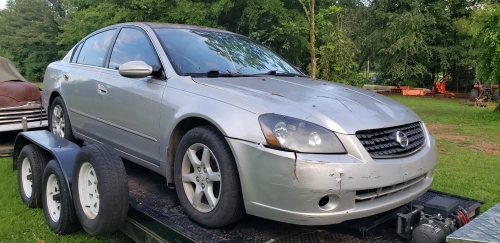In Australia, a car with no title often means it lacks a current registration certificate. Owners face this issue when vehicles sit unused or get damaged beyond easy repair. Car removal services, scrap yards, and auto wreckers buy these cars. They handle the paperwork and offer cash based on the vehicle’s condition and parts value.
This setup helps owners dispose of unwanted cars without extra costs. Private buyers sometimes show interest, but they require proof of ownership to avoid legal risks. State laws allow sales if you prove you own the car through documents like purchase receipts or VIN details.
Abandoned or unregistered cars pile up in driveways or streets. Councils remove them if reported, but selling provides a better option. You avoid fines and gain some money from metal or reusable parts.
Proof of ownership stays key in every sale. Without it, buyers hesitate due to theft concerns. Use IDs, old rego papers, or affidavits to confirm your right to sell.
For a smooth process, companies like Best Cash For Cars provide a solid solution. They buy unregistered vehicles nationwide and pay up to $9,999 on the spot. Their free towing and quick quotes make them a go-to choice for sellers needing fast results.
Understanding “No Title” in Australia
No title refers to a car without valid registration papers. In Australia, registration proves legal ownership and roadworthiness. Cars lose titles when rego expires, gets cancelled, or papers go missing.
Common reasons include long-term storage or major accidents. Owners forget to renew rego, leading to unregistered status. Stolen titles also happen, but recovery involves police reports.
States handle titles differently. New South Wales requires a Notice of Disposal form for sales. Queensland needs unregistered vehicle permits for moving sold cars.
Without a title, driving becomes illegal. Fines reach hundreds of dollars per state. Selling avoids these penalties and clears space.
Legal Requirements for Selling a Car Without Registration
You can sell an unregistered car legally in Australia. Provide proof of ownership, such as a driver’s licence, purchase receipt, or bill of sale.
Advertise the car as unregistered to set clear expectations. Buyers must know they handle any re-registration. No roadworthy certificate is needed for unregistered sales in Victoria.
State rules vary slightly. Western Australia allows sales to interstate buyers without transferring local licences. Always check with your local roads authority for exact forms.
If the car links to finance, clear any debts first. Sellers guarantee clear title under Australian Consumer Law. Failing this risks legal action from buyers.
Types of Buyers for Cars Without Titles
Car removal services buy unregistered cars for parts or scrap. They offer cash and free towing, making sales easy. Examples include services that accept any make or model in poor condition.
Scrap yards and auto wreckers focus on metal recycling. They pay based on weight and material value. Most accept cars without titles if ownership proof exists.
Private buyers rarely take unregistered cars. They prefer roadworthy vehicles to avoid repair costs. Online marketplaces list them, but sales take longer.
Dealerships avoid no-title cars due to resale challenges. They need clean paperwork for financing options. Wreckers fill this gap for end-of-life vehicles.
Statistics on End-of-Life Vehicles in Australia
Australia sees high volumes of vehicles reaching scrap age. These stats highlight the scale and recycling efforts.
| Statistic | Value | Source |
|---|---|---|
| Annual end-of-life vehicles | 850,000 | Industry reports |
| Waste generated from these vehicles | 1.36 million tonnes | Automotive studies |
| Recycling rate of vehicle waste | 70% | Recycling research |
| Industry revenue from auto recycling | $1.25 billion | Market analysis |
| Businesses in dismantling and recycling | 1,800 | Industry data |
These numbers show a robust recycling sector. It employs 4,500 people and processes 800,000 vehicles yearly. Landfill waste drops with better practices.
Abandoned vehicles add to these figures. Councils handle reports, but exact nationwide counts vary. Local governments impound thousands each year in major cities.
Also visit for best cash for cars services: https://www.bestcashforcarz.com.au/
How to Sell Your Car Without a Title
To sell a car without a title, gather ownership proof first. Use your ID, old rego papers, or a statutory declaration.
Get quotes from multiple buyers. Call car removal services or visit scrap yards. Compare offers based on your car’s make, model, and condition.
Prepare the car for pickup. Remove personal items and drain fluids if required. Buyers often handle this, but check ahead.
Complete the sale paperwork. Sign any forms provided by the buyer. Receive payment on the spot for cash deals.
If issues arise, consult state transport sites. For example, VicRoads requires notification within 14 days of sale. This step protects both parties.
Challenges and Tips for Sellers
Sellers face low offers for damaged cars. Expect payments from $100 to $9,999 depending on value. Negotiate by highlighting usable parts.
Environmental rules apply. Buyers must recycle properly to avoid pollution. Choose licensed operators for compliance.
Avoid scams by verifying buyer credentials. Legitimate services provide free quotes and no-obligation offers.
If the car holds sentimental value, consider restoration. Otherwise, selling clears space and provides funds.
Find out more here: https://www.bestcashforcarz.com.au/we-buy-cars
Conclusion
Selling a car with no title works through specialized buyers in Australia. Car removal services and wreckers make it straightforward with cash and towing. Follow legal steps for a safe transaction. These options turn unused vehicles into resources.
Explore related guides in our automotive advice hub.
